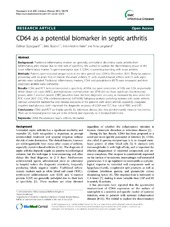CD64 as a potential biomarker in septic arthritis
Peer reviewed, Journal article
Published version
Permanent lenke
https://hdl.handle.net/1956/7050Utgivelsesdato
2013-06-19Metadata
Vis full innførselSamlinger
Originalversjon
https://doi.org/10.1186/1471-2334-13-278Sammendrag
Background Traditional inflammatory markers are generally unhelpful in discerning septic arthritis from inflammatory joint disease due to their lack of specificity. We wished to explore the discriminatory power of the novel inflammatory marker, Fc-gamma-receptor type 1, CD64, in patients presenting with acute arthritis. Methods Patients were recruited prospectively in the time period June 2009 to December 2011. Thirty-six patients presenting with an acute flare of chronic rheumatic arthritis, 31 with crystal-induced arthritis and 23 with septic arthritis were included. Traditional inflammatory markers, CD64 and procalcitonin (PCT) were measured and their diagnostic abilities were compared. Results CD64 and PCT both demonstrated a specificity of 98%, but poor sensitivities of 59% and 52%, respectively. White blood cell count (WBC), and erythrocyte sedimentation rate (ESR) did not have significant discriminatory power, while C-reactive protein (CRP) proved to have the best diagnostic accuracy as measured by area under the ROC curve (AUC 0.92, 95% confidence-interval 0.87-0.98). Subgroup analysis excluding patients with septic arthritis without concurrent bacteremia, and likewise exclusion of the patients with septic arthritis caused by coagulase negative staphylococci, both improved the diagnostic accuracy of CD64 and PCT, but not of WBC and CRP.</p< Conclusions CD64 and PCT are highly specific for infectious disease, but they predominantly measure bacteremia. Their use in hospital practice has yet to be defined, and especially so in localized infections.
Utgiver
BioMed CentralTidsskrift
BMC Infectious DiseasesOpphavsrett
Oddvar Oppegaard et al.; licensee BioMed Central Ltd.Copyright 2013 Oppegaard et al.; licensee BioMed Central Ltd. This is an Open Access article distributed under the terms of the Creative Commons Attribution License (http://creativecommons.org/licenses/by/2.0), which permits unrestricted use, distribution, and reproduction in any medium, provided the original work is properly cited.

